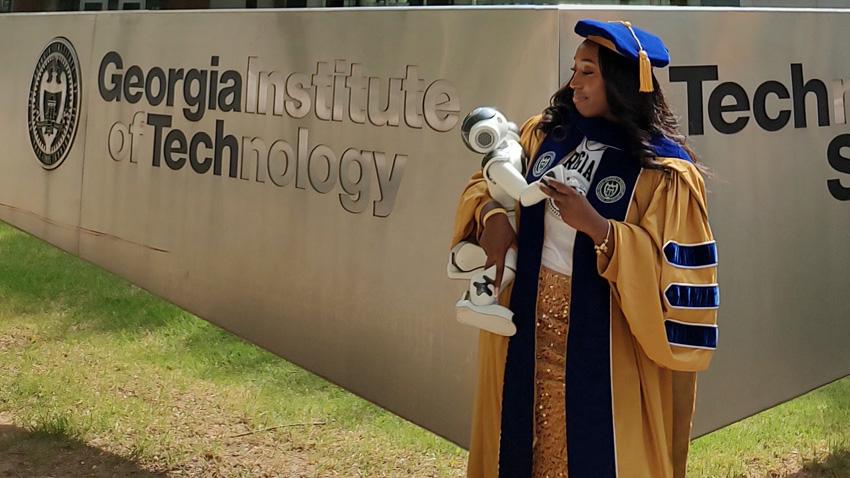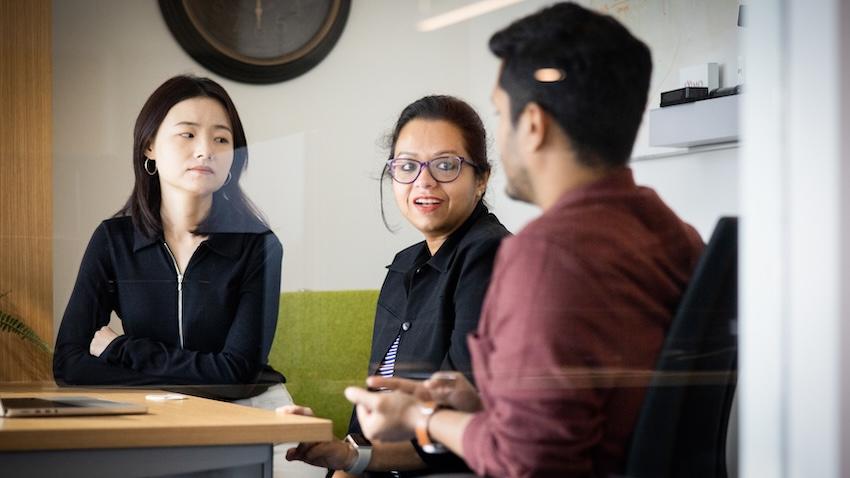
New Ph.D. Alumna Paving the Way for More Black Women in Robotics
The gender and race disparities in computing lead to a world with less inclusive technical advances. According to the Equal Employment Opportunity Commission (EEOC), the tech field is predominantly made up of white males. This lack of diversity makes it a difficult place to navigate for underrepresented groups such as people of color (POC) and women.
“We continue to witness examples of technologies being developed that either disregard or actively harm marginalized communities. Perhaps if the teams creating these technologies more closely resembled the communities using them, we could forge a more equitable future,” said Tamara Pearson, deputy director of the Constellations Center for Equity in Computing at Georgia Tech.
De’Aira Bryant, a Black woman, successfully defended her dissertation and graduated from the Georgia Institute of Technology this month with a Ph.D. in computer science and robotics. Her accomplishment underscores the importance of diversity and inclusion in STEM and serves as an inspiration to aspiring researchers from underrepresented backgrounds.
We had a conversation with Bryant about what reaching this milestone means for her.
1. Can you share your journey leading up to pursuing a Ph.D. in robotics?
I went to undergrad for computer science. In my freshman year, I started working in a research lab that was doing human-robot interaction for educational purposes for children. It made me want to pursue a Ph.D. in computer science, which led me to Georgia Tech. I did a summer research experience, and then I fell in love. I applied, and here I am.
2. Could you tell us about your doctoral research focus and any findings you're particularly proud of?
For my doctoral focus, we looked at the intersection of bias and human-robot interaction. Focusing on human bias, meaning how humans perceive robots when they may have different voices or different colors of their outer shells. We investigated whether humans apply concepts of race and gender to robots and how that affects their interactions with them. We found some interesting stuff there that tells us, as robot designers, how we should be creating the platforms that will be used in society.
3. What challenges did you face as a Black woman, and how did you overcome them?
One of the biggest challenges I've had to overcome is impostor syndrome. I am very critical of myself, knowing that I didn't have a lot of CS experience before going to college and being a first-gen student who had never had anybody in my immediate family get a Ph.D. It was a very daunting task. I've been there many times where I questioned whether I was doing the right thing or whether I had the skills or ability to be here. I think constantly having to encourage myself and find community have been ways that I have dealt with that, but I still struggled. On the other side of me questioning my own worth, there's always the question in the back of my head: do other people wonder if I’m here because I’m the only Black person? It may or may not be the case; it just puts you on edge.
4. Can you discuss the importance of diversity and inclusion in robotics, and what initiatives you'd like to see implemented to encourage more underrepresented groups to pursue careers in STEM?
Diversity and inclusion are important because talent is universally distributed, but opportunity is not. To reach people who may lack resources or the typical experience we seek, we need to implement programs that incorporate diverse perspectives. This approach will influence the development of our technological systems and the society we create. An initiative I’d like to see, especially in the CS, robotics, and AI spaces, is an increase in AI literacy. I believe this will be a key component, not only for individuals interested in developing tech but also for society. Children are interacting with AI before they can even read; they're being recommended videos on YouTube, and they can navigate software effortlessly. It's increasingly important to educate our kids and the general population so that they can develop a critical understanding of these systems.
5. What advice would you give to young Black girls who aspire to follow in your footsteps and pursue a career in STEM?
I would tell them their presence is necessary. As roboticists, we use our power to influence the direction of AI in the future. Black women have always been at the forefront of enabling change, so I think it's important that we continue to see our Black girls involved in STEM. We need them in the space, coming up with ideas and pushing the envelope for what's next. I would tell them to just keep going, not be discouraged, and to believe in themselves. I think that's one of the biggest hurdles I had to overcome. Black women have been some of my biggest cheerleaders, whether they are ahead of me in the pipeline, near me, or across from me in the pipeline. If we pay it forward and the next generation pays it forward, we will continue to see the legacy of our ancestors proliferate forever.
6. In what ways do you hope to use your expertise in robotics to make a positive impact on society or address pressing challenges?
By continuing my thesis work, which highlighted how AI bias through perceptual algorithms like face detection or facial expression could be biased, I have contributed to the empirical evidence that we need to build robots that are more inclusive and equitable. Whatever the AI perceptual ability may be, when robots use that technology, it might be harder to determine that it is biased, but it is still biased and could be even more concerning when that bias is active in the world. My work has contributed to the empirical evidence that we need to build robots that are more inclusive and equitable. We also need to design algorithms that are more bias-aware and that can potentially counteract existing stereotypes through robot engagement. My passion for outreach and representation drives me to engage actively in classrooms, workshops, and science fairs, aiming to inspire students to challenge their worldviews.
7. How do you envision the future of robotics, particularly in terms of its potential to address issues of equity and social justice?
I think a lot of the conversation now is about how robotic technology in AI is being used to proliferate bias in society. But my moonshot is that if we can develop these systems in the right way, if we can regulate them in the right way, if we can test them, and incorporate the right voices to design the technology the way it should be, then it can even help us mitigate existing biases in society. My vision would be that we use this technology as a force to promote inclusivity, equity, and fairness in our society more so than what we see now. They could be tools of social justice if we design them correctly.
8. What does it mean to you to be one of the few Black women to earn a Ph.D. in robotics, and what message would you like to share with others who may be facing similar barriers or doubts?
I can't even describe what it means. Since I posted that I successfully defended my thesis, I've received an outpouring of love, support, and congratulations from all corners. I can see that it’s much bigger than me. People I know and people I don't know are excited and happy for me. It makes me extremely proud to be in this position and proud of the people who made the sacrifices, broke the ceilings, and shattered the glass for me to be here. It makes me want to promote the same ideals the people who encouraged me promoted. I want to do that for other people who want to do similar things so I can make sure I’m not the only one. I'm happy, but it’s also bittersweet because it would be better if there were more Black women in this space. Overall, I'm just extremely proud and humbled to be in this position and excited to continue and be that change that I hope to see.


